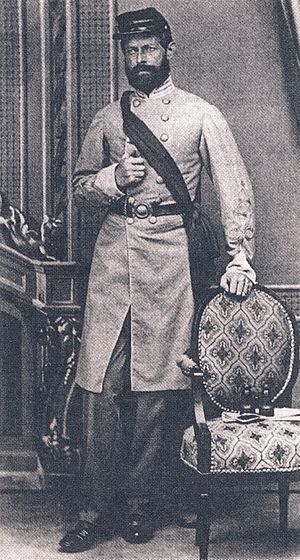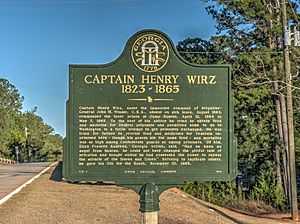Henry Wirz facts for kids
Quick facts for kids
Henry Wirz
|
|
|---|---|

Wirz around 1865
|
|
| Born |
Hartmann Heinrich Wirz
November 25, 1823 Zürich, Switzerland
|
| Died | November 10, 1865 (aged 41) |
| Cause of death | Execution by hanging |
| Criminal status | Executed |
| Spouse(s) |
Elizabeth Wolfe
(m. 1854) |
| Children | 1 |
| Conviction(s) | Serious wartime offenses War crimes (10 counts) |
| Criminal penalty | Death |
| Military career | |
| Buried |
Mount Olivet Cemetery
|
| Allegiance | |
| Service/ |
|
| Years of service | 1861–1865 |
| Rank | |
| Commands held | Andersonville Prison |
| Battles/wars | American Civil War |
Henry Wirz (born Hartmann Heinrich Wirz, November 25, 1823 – November 10, 1865) was a Swiss-American officer who served in the Confederate States Army during the American Civil War. He was in charge of the stockade at Camp Sumter, a Confederate prisoner-of-war camp located near Andersonville, Georgia.
At Camp Sumter, nearly 13,000 Union prisoners died because of very harsh conditions. After the war, Wirz was put on trial and executed. He was found guilty of serious offenses related to his command of the camp, including being part of a plan to harm prisoners and causing their deaths.
Since his execution, people have debated whether Wirz was truly responsible for everything that happened at Camp Sumter and if his trial was fair.
Early Life and Work
Henry Wirz was born Hartmann Heinrich Wirz on November 25, 1823, in Zürich, Switzerland. His father, Johann Caspar Wirz, was a master tailor and a member of the city council. His mother was Sophie Barbara Philipp.
Wirz went to elementary and secondary school. He wanted to become a doctor, but his family could not afford the medical training. Instead, he studied to become a merchant in Zürich and Turin from 1840 to 1842. After that, he started working at a department store in Zürich. In 1845, he married Emilie Oschwald, and they had two children.
In 1847, Wirz faced legal troubles and was sentenced to prison. He was released the next year, and his sentence was changed to 12 years of exile from Zürich. His wife did not want to leave, and their marriage ended in 1853. Wirz first traveled to Moscow in 1848, then to the United States in 1849. He found work in a factory in Lawrence, Massachusetts.
After five years, he moved to Hopkinsville, Kentucky, where he worked as a doctor's assistant. He learned how to do small surgeries and set broken bones. He also tried to start his own medical practice in Cadiz, Kentucky, and worked at a special health clinic in Northampton, Massachusetts.
In 1854, Wirz married Elizabeth Wolfe, who was a widow with two daughters. They moved to Louisiana, where they had a daughter together. In 1856, Wirz met Levin R. Marshall, who owned a large farm called Cabin Teele. Wirz worked there as an overseer and also offered medical care.
Wirz in the Civil War
When the American Civil War began in 1861, Henry Wirz was 37 years old. He joined the Confederate army as a private in Louisiana.
Wirz later said he was part of the Battle of Seven Pines in May 1862. He claimed he was an assistant to General Joseph E. Johnston during this battle and was wounded in his right arm. Some historians question this story, suggesting his injury might have happened during a long trip to find missing records of Union prisoners. He recovered from his injury by the end of 1862.
After returning to his unit in June 1862, Wirz was promoted to captain for his bravery. Because of his injury, he was assigned to the staff of General John H. Winder. General Winder was in charge of Confederate prisoner-of-war camps.
Wirz's daughter later said that Confederate President Jefferson Davis sent Captain Wirz on a special mission to Europe. He was said to have carried secret messages to Confederate officials in England and France. Wirz returned from Europe in January 1864 and began working for General Winder in the prison department in Richmond, Virginia. Wirz first worked as a prison commander in Alabama before being moved to help guard Union prisoners in Richmond.
Camp Sumter Prison

In February 1864, the Confederate government built Camp Sumter. This was a large military prison located near Anderson (now Andersonville) in south-western Georgia. It was built to hold Union prisoners of war. In April 1864, Wirz arrived at Camp Sumter and stayed there for over a year. He was the commander of the prison's stockade and its inner area.
Wirz was praised by his commanders and even by some prisoners. He was even suggested for a promotion to major, but it did not happen.
Camp Sumter was not fully built as planned and quickly became too crowded with Union prisoners. The original plan was to have wooden barracks, but instead, prisoners were kept in a large, open-air stockade. This area was about 16.5 acres and was only meant to be a temporary prison. The prisoners started calling this place "Andersonville," which became its common name.
Camp Sumter had many problems:
- It was severely overcrowded.
- Sanitary conditions were very poor.
- There was an extreme lack of food, tools, and medical supplies.
- There was not enough clean drinking water.
Wirz knew the conditions were bad and asked his superiors for more support, but his requests were denied. In July 1864, he sent five prisoners to the Union side with a letter written by the inmates. The letter asked the Union government to negotiate their release.
At its busiest in August 1864, Camp Sumter held about 32,000 Union prisoners. This made it one of the largest "cities" in the Confederacy at the time. Each month, around 3,000 prisoners died from diseases like dysentery and from not having enough food. Over the 14 months the camp was open, about 45,000 prisoners were held there. Close to 13,000 of them (28%) died.
In Popular Culture
Wirz is an important character in MacKinlay Kantor's famous novel Andersonville (1955). He appears early in the book during his mission to France in October 1863.
In Saul Levitt's 1959 play The Andersonville Trial, Wirz was first played by Herbert Berghof. When the play was made into a TV episode for Hollywood Television Theatre in 1970–71, Richard Basehart played Wirz. The Czech actor Jan Tříska portrayed Wirz in the American film Andersonville (1996).
See also
 In Spanish: Henry Wirz para niños
In Spanish: Henry Wirz para niños
 | Charles R. Drew |
 | Benjamin Banneker |
 | Jane C. Wright |
 | Roger Arliner Young |

